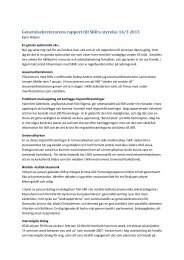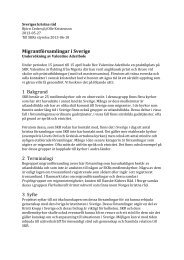Tyngdpunktsförskjutning rapport (PDF) - Sveriges kristna råd
Tyngdpunktsförskjutning rapport (PDF) - Sveriges kristna råd
Tyngdpunktsförskjutning rapport (PDF) - Sveriges kristna råd
Create successful ePaper yourself
Turn your PDF publications into a flip-book with our unique Google optimized e-Paper software.
destruction and economic collapse creating profound impoverishment; the legacies of crippling bitterness, fear<br />
and division. These are some of the many reasons why civil society actors feel compelled to use their energy<br />
and creativity to find alternatives to violence, to end wars, and prevent them from starting or reoccurring. As<br />
people become directly affected by armed conflict, they develop a central interest in contributing to its<br />
resolution. Living alongside the armed actors, they have greater need and greater potential to take part in<br />
peace-‐building.<br />
Civil society as a force for people-‐centered security<br />
In a time when the world is divided in its approach to promoting security, the UN has championed a more<br />
holistic approach, as embodied in UN Secretary General Kofi Annan’s observation that: “The world must<br />
advance the causes of security, development and human rights together, otherwise none will succeed.<br />
Humanity will not enjoy security without development, it will not enjoy development without security, and<br />
it will not enjoy either without respect for human rights.” 13<br />
People can be agents of this security, not merely passive recipients. Fulfilling this potential, however,<br />
necessitates changing the state’s ‘security monopoly’: the view that governments are solely responsible for<br />
providing security and this can best be achieved through military capacity and the threat of force.<br />
Governments have a primary obligation to provide security.<br />
Yet in a globalizing world, preventing violent conflict and building sustainable peace requires complex<br />
strategies. These need to address structural causes of conflict, many of which may be inherent in the<br />
global system. To do so effectively requires cooperation between civil society actors at the local,<br />
national, regional and global levels and with governments, intergovernmental organizations and, in some<br />
cases, businesses. Yet the role of civil society organizations (CSOs) in promoting peace and security<br />
remains contested by some, who see them either as irrelevant or as a threat to the sovereign prerogative<br />
of states.<br />
Civil society can contribute depth and durability to peace-‐building<br />
Even using the methods of power politics and military intervention, it is extremely difficult to ‘impose’<br />
peace on those who remain committed to achieving their objectives through violence. Sustainable peace<br />
cannot be achieved through the exercise of force alone; effective dialogue must be an integral part of any<br />
process aimed at truly resolving the conflict. At some point, those involved need to agree the basic terms<br />
and conditions in which they will co-‐exist. It is not possible to make peace without truly engaging with<br />
others across the conflict divide. In many cases, the engagement of large segments of the wider society in<br />
peace-‐building processes can give depth and durability to the changes needed to support sustainable<br />
peace.<br />
One of the greatest strengths civil society bring to working with conflict is their capacity to support changes<br />
in how people respond to conflict and to direct attention to the underlying causes that need to be<br />
addressed if a sustainable and just peace is to emerge. Furthermore, civil society actors have the potential<br />
to play an important role in raising awareness both of the costs of continued conflict and the opportunities<br />
and means to seek a way out through constructive engagement with opponents. While they can facilitate<br />
dialogue between the primary protagonists in armed struggle, CSO-‐led processes are often focused on<br />
enabling ordinary people to articulate what they really need and then working to find a common ground<br />
from which they can work to establish peaceful co-‐existence. Instead of the use of force, civil society actors<br />
generally rely on their creativity by stimulating a new sense of what is possible and how it can be achieved.<br />
This capacity is rooted, ultimately, in a sense of agency: the ability to act together with others to change the<br />
world.<br />
Agents for change: key functions of civil society peace-‐building<br />
Civil society responds to conflict in numerous ways. While often part of the forces supporting war, it is also<br />
one of the powerful forces promoting peace. CSO roles in humanitarian relief, development and human<br />
rights protection are well understood. What is less well known are<br />
13 In Larger Freedom: Towards Development, Security and Human Rights for All. Report of the Secretary-‐General. 21 March 2005. A/59/2005.<br />
http://www.un.org/largerfreedom/contents.htm.<br />
31









